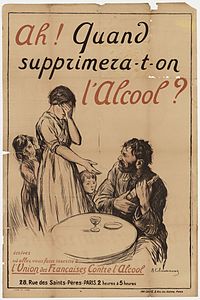
Photo from wikipedia
OBJECTIVE To the authors' knowledge, no data have been reported on dopamine fluctuations on subsecond timescales in humans with alcohol use disorder (AUD). In this study, dopamine release was monitored… Click to show full abstract
OBJECTIVE To the authors' knowledge, no data have been reported on dopamine fluctuations on subsecond timescales in humans with alcohol use disorder (AUD). In this study, dopamine release was monitored in 2 patients with and 2 without a history of AUD during a "sure bet or gamble" (SBORG) decision-making task to begin to characterize how subsecond dopamine responses to counterfactual information, related to psychological notions of regret and relief, in AUD may be altered. METHODS Measurements of extracellular dopamine levels were made once every 100 msec using human voltammetric methods. Measurements were made in the caudate during deep brain stimulation electrode implantation surgeries (for treatment of movement disorders) in patients who did (AUD, n = 2) or did not (non-AUD, n = 2) have a history of AUD. Participants performed an SBORG decision-making task in which they made choices between sure bets and 50%-chance monetary gamble outcomes. RESULTS Fast changes were found in dopamine levels that appear to be modulated by "what could have been" and by patients' AUD status. Positive counterfactual prediction errors (related to relief) differentiated patients with versus without a history of AUD. CONCLUSIONS Dopaminergic encoding of counterfactual information appears to differ between patients with and without AUD. The current study has a major limitation of a limited sample size, but these data provide a rare insight into dopaminergic physiology during real-time decision-making in humans with an addiction disorder. The authors hope future work will expand the sample size and determine the generalizability of the current results.
Journal Title: Neurosurgical focus
Year Published: 2023
Link to full text (if available)
Share on Social Media: Sign Up to like & get
recommendations!